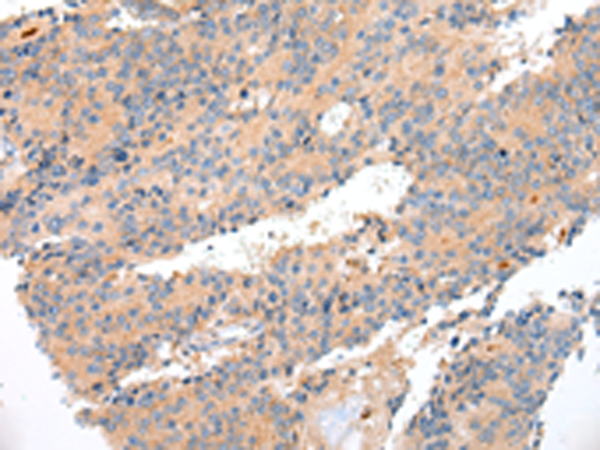
| WB | 1/500-1/1000 | Human,Mouse,Rat |
| IF | 1/20 | Human,Mouse,Rat |
| IHC | 咨询技术 | Human,Mouse,Rat |
| ICC | 技术咨询 | Human,Mouse,Rat |
| FCM | 咨询技术 | Human,Mouse,Rat |
| Elisa | 咨询技术 | Human,Mouse,Rat |
| Aliases | M6S1; NPP1; NPPS; PC-1; PCA1; ARHR2; COLED; PDNP1 |
| Host/Isotype | Rabbit IgG |
| Antibody Type | Primary antibody |
| Storage | Store at 4°C short term. Aliquot and store at -20°C long term. Avoid freeze/thaw cycles. |
| Species Reactivity | Human |
| Immunogen | Synthetic peptide of human ENPP1 |
| Formulation | Purified antibody in PBS with 0.05% sodium azide and 50% glycerol. |
+ +
以下是关于IKB epsilon(IKBKE)抗体的3篇参考文献,涵盖其在信号通路、疾病机制及实验方法中的应用:
---
1. **文献名称**:*IKKε and TBK1 are essential components of the IRF3 signaling pathway*
**作者**:Fitzgerald KA, et al.
**摘要**:该研究阐明了IKBKE(IKKε)与TBK1在IRF3信号通路中的关键作用,证实两者通过磷酸化IRF3促进I型干扰素的产生。文中提到使用特异性抗IKBKE抗体进行免疫沉淀和Western blot分析,验证了IKBKE在病毒感染后先天免疫应答中的功能。
---
2. **文献名称**:*Oncogenic activation of the NF-κB pathway by TBK1 and IKKε in breast cancer*
**作者**:Boehm JS, et al.
**摘要**:本研究揭示了IKBKE在乳腺癌中的致癌机制,发现其过表达通过激活NF-κB和STAT信号通路促进肿瘤生长。作者利用抗IKBKE抗体进行免疫组化及基因沉默实验,证明IKBKE在肿瘤样本中高表达,并可作为潜在治疗靶点。
---
3. **文献名称**:*A role for IKKε in the control of inflammasome activation*
**作者**:Mao X, et al.
**摘要**:该文献报道了IKBKE通过调控NLRP3炎症小体活性影响炎症反应。研究采用抗IKBKE抗体进行Western blot和免疫荧光染色,发现IKBKE缺失导致炎症因子IL-1β分泌减少,揭示了其在炎症性疾病中的新机制。
---
**备注**:若需获取全文或更多文献,建议通过PubMed、Google Scholar等平台检索关键词“IKBKE antibody”或“IKKε antibody”,并筛选涉及抗体实验(如WB、IP、IF)的研究。部分文献可能需要通过机构订阅访问。
The IκB epsilon (IkBε) antibody is a crucial tool in studying the regulatory mechanisms of the NF-κB signaling pathway. IκBε, a member of the IκB (inhibitor of κB) protein family, acts as a cytoplasmic inhibitor of NF-κB transcription factors by binding to them and sequestering them in an inactive state. Unlike the more extensively studied IκBα and IκBβ, IκBε exhibits distinct expression patterns and regulatory roles, particularly in immune and inflammatory responses. It is phosphorylated by the IκB kinase (IKK) complex upon stimuli such as cytokines or pathogens, leading to its ubiquitination and proteasomal degradation. This releases NF-κB, allowing its translocation to the nucleus to activate target genes.
Antibodies against IκBε are widely used to investigate its expression, post-translational modifications, and interactions in various cellular contexts. They enable detection via techniques like Western blotting, immunoprecipitation, and immunofluorescence. Research applications include studying NF-κB dynamics in inflammation, cancer, and autoimmune diseases, where dysregulated IκBε-NF-κB interactions are implicated. Commercial IκBε antibodies are typically validated for specificity across species (e.g., human, mouse) and may target specific epitopes or phosphorylation sites (e.g., Ser18/22). Understanding IκBε's role through these antibodies provides insights into pathway-specific regulation and potential therapeutic targeting of NF-κB-associated disorders.
×